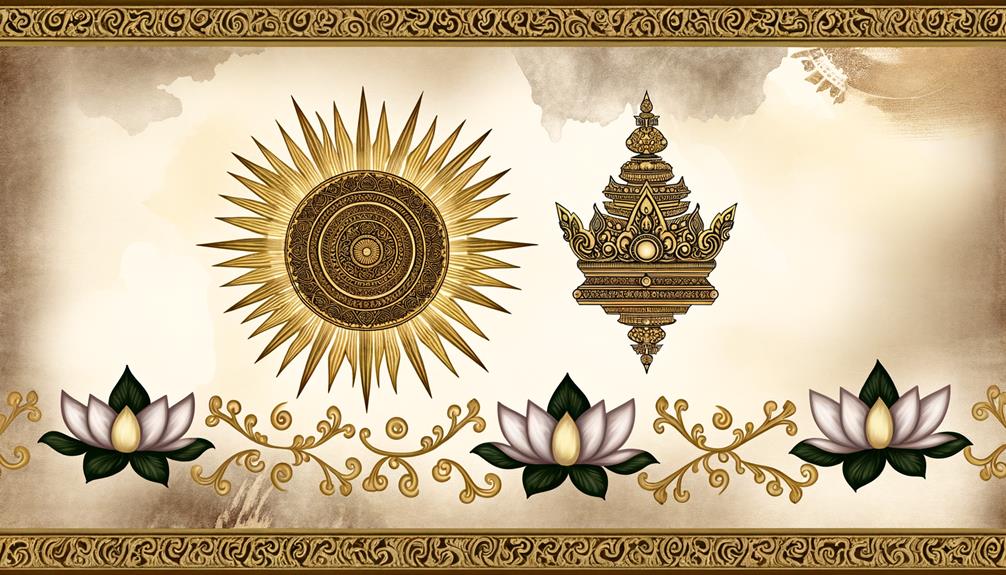Rajan Name Meaning in English
The name 'Rajan' originates from the Sanskrit language, denoting 'king' or 'ruler'. It is rooted in the term 'raj', which means 'to rule' or 'to reign'.
Historically, 'Rajan' has been prevalent since the Vedic period, appearing in ancient texts such as the Rigveda, Mahabharata, and Ramayana. The name signifies leadership, wisdom, and nobility, reflecting ideals of authority and governance.
It is linguistically connected to the Sanskrit term 'rājan' and carries significant cultural and historical influence across various regions of India. If one desires to explore further, additional layers of meaning and cultural context await.

Key Takeaways
- Rajan means 'king' or 'ruler' in English.
- The name is derived from the Sanskrit term 'rājan'.
- It signifies leadership, authority, and governance.
- Historically, it denotes wisdom, justice, and nobility.
- The name has cultural significance across different regions in India.
Etymology of 'Rajan'
The term 'Rajan' originates from the ancient Sanskrit language, where it denoted a king or ruler. This etymological root underscores the term's connotation of authority and governance.
In Sanskrit, 'Rajan' is derived from the root word 'raj,' which translates to 'to rule' or 'to reign.' Over time, the term evolved linguistically but retained its original meaning, symbolizing leadership and nobility.
Sanskrit, being one of the oldest Indo-European languages, played a pivotal role in shaping the linguistic heritage of South Asia. The usage of 'Rajan' in various texts and inscriptions signifies its importance in ancient hierarchical structures.
Understanding this etymology provides insight into the cultural and societal significance that the name 'Rajan' has historically embodied.
Historical Origins
Historical documentation reveals that the name 'Rajan' has been prevalent since the Vedic period, prominently featured in ancient Indian texts and scriptures. Derived from the Sanskrit word 'raja,' meaning king or ruler, 'Rajan' was often used to denote individuals of high status or authority.
References to 'Rajan' can be found in the Rigveda, where it is used to describe leaders and chieftains. The name further appears in the Mahabharata and Ramayana, emphasizing its longstanding presence and significance in Indian history.
Throughout the centuries, 'Rajan' has maintained its association with leadership and governance, reflecting the socio-political structures of ancient Indian civilization. This historical continuity underscores the enduring legacy of the name 'Rajan' within Indian heritage.
Cultural Significance
The cultural significance of the name Rajan is multifaceted, encompassing its historical importance as a symbol of leadership and nobility in ancient Indian societies.
Symbolic interpretations of Rajan often align with qualities of wisdom and justice, reflecting its etymological roots in the Sanskrit word for 'king.'
Additionally, regional variations in the use and perception of the name highlight its adaptability and enduring relevance across different cultural contexts within India.
Historical Importance
Rooted in ancient Sanskrit, the name Rajan has held significant cultural and historical importance across various regions in India. Historically, the term 'Rajan' translates to 'king' or 'ruler,' reflecting its association with leadership and governance in Vedic and subsequent eras.
The name is prominently featured in ancient texts such as the Rigveda, where it designates tribal chieftains and sovereigns. Over centuries, the name Rajan has been emblematic of authority, wisdom, and nobility within Indian society. It was often bestowed upon individuals who exhibited leadership qualities or belonged to royal lineages.
Through its enduring presence in Indian history, the name has become a symbol of the country's rich cultural and historical heritage.
Symbolic Interpretations
Beyond its historical prominence, the name Rajan also carries profound symbolic interpretations within Indian culture, reflecting ideals of leadership, wisdom, and nobility.
Historically, 'Rajan' translates to 'king' in Sanskrit, a title denoting authority and governance. This appellation is not merely a designation but a representation of moral and ethical stewardship.
In Vedic literature, a Rajan is often depicted as a protector of dharma (righteousness), embodying justice and virtue. The name symbolizes an aspirational archetype, where the bearer is expected to exhibit sagacity and magnanimity.
Additionally, Rajan signifies a guiding light in the societal hierarchy, entrusted with the welfare of their people, encapsulating both spiritual and temporal leadership rooted in Indian ethos.
Regional Variations
Across different regions of India, the name Rajan carries distinct cultural nuances that reflect the diverse historical and societal influences shaping its significance.
In North India, particularly among Hindi-speaking communities, Rajan often connotes royal lineage and governance, stemming from its Sanskrit roots meaning 'king' or 'ruler.'
In South India, the name integrates seamlessly into Dravidian linguistic traditions, where it might signify respected leadership within local societal structures.
Meanwhile, in the eastern states, including Bengal, the name Rajan is less prevalent but still associated with nobility and intellectual stature.
Each region's historical context, from ancient monarchies to colonial influences, imparts unique layers of meaning to the name, making it a rich subject of cultural significance across India.
Linguistic Roots
The name 'Rajan' finds its linguistic roots in Sanskrit, an ancient Indo-European language of India.
Historically, 'Rajan' translates to 'king' or 'ruler,' encapsulating a sense of nobility and leadership.
Its etymological significance has deeply influenced cultural contexts, lending the name a timeless prestige across various Indian traditions.
Sanskrit Origin
Tracing its etymology, the name 'Rajan' originates from the ancient Sanskrit word 'राजन्' (rājan), which translates to 'king' or 'ruler.' This term is deeply embedded in the linguistic and cultural fabric of ancient India. The significance of the name ‘Rajan’ in Indian culture reflects the reverence and respect for leadership and authority. Similarly, the meaning of the name Raman can be traced back to the Sanskrit word ‘Rama,’ which signifies “pleasing” or “charming.” Both names carry a rich history and cultural significance in India.
Sanskrit, recognized as one of the oldest languages in the Indo-European family, served as a liturgical language for Hinduism and a scholarly lingua franca in historical Southeast Asia.
The word 'rājan' itself is derived from the root 'raj,' meaning to rule or to reign. This root word has permeated various other languages in the Indian subcontinent, reflecting the hierarchical societal structures and governance systems of ancient Indian civilization.
Such etymological insights underscore the significant historical and cultural connotations associated with the name.
Meaning of Rajan
Delving into its linguistic roots, the name 'Rajan' encapsulates the essence of leadership and authority, derived from the ancient Sanskrit term 'rājan,' signifying a king or ruler. Historically, the term 'rājan' has been pivotal in shaping the sociopolitical structures of early Indo-Aryan civilizations. It connotes not only political leadership but also moral and ethical stewardship.
The linguistic evolution of 'rājan' is remarkable, influencing various Indo-European languages and reflecting the inherent reverence for governance and order.
- Sanskrit Origin: Derives from 'rājan,' meaning king.
- Historical Usage: Used extensively in Vedic literature.
- Linguistic Influence: Impacted other Indo-European languages.
- Symbolic Essence: Embodies leadership and authority.
Cultural Significance
Building upon its historical and etymological foundations, the cultural significance of the name 'Rajan' extends deeply into various traditions and practices, reflecting the enduring reverence for leadership and governance in numerous societies.
Derived from the Sanskrit word 'Rājān,' translating to 'king' or 'ruler,' the name encapsulates a profound respect for authority and order. Throughout history, the term has been integral within Indian epics such as the Mahabharata and Ramayana, symbolizing both the divine right to rule and the moral responsibilities of leadership.
In contemporary contexts, 'Rajan' remains a popular name in South Asia, preserving its association with nobility and ethical governance, thereby continuing to influence cultural narratives and individual identities.
Symbolism in Names
The name 'Rajan,' derived from the Sanskrit word for 'king,' carries profound symbolic significance, representing leadership, authority, and nobility throughout various cultures and historical periods. This nomenclature has been emblematic of power and governance, deeply rooted in ancient civilizations and their hierarchical structures.
The symbolism of 'Rajan' encompasses:
- Leadership: Signifying the ability to guide and inspire.
- Authority: Representing legitimate power and control.
- Nobility: Indicating a status of high moral and social standing.
- Historical prestige: Reflecting a legacy of influential rulers and dignitaries.
Such names often encapsulate a wealth of cultural and historical connotations, providing insight into the values and societal norms of the times. This analysis underscores the enduring impact of nomenclature on identity and perception.
'Rajan' in Literature
Examining the portrayal of 'Rajan' in literature reveals how the name's symbolic resonance with leadership and nobility has been harnessed by authors to craft characters embodying these attributes.
Historically, 'Rajan' surfaces in classical Indian texts as a designation for kings and leaders, infusing the narrative with a sense of authority and moral integrity.
In modern literature, the name continues to be employed to evoke notions of power and virtue. Characters named Rajan are frequently depicted as wise, just, and strategic, often positioned at the helm of vital decisions or transformative journeys.
This literary use underscores the cultural weight the name carries, reinforcing its association with regal qualities and ethical strength, thereby enriching the narrative's thematic depth.
Modern Usage
In contemporary contexts, the name 'Rajan' retains its historical connotations of leadership and nobility, continuing to be a popular choice across diverse communities. This name is frequently selected for its strong cultural resonance and its association with regal attributes. The modern usage of 'Rajan' spans various sectors and demographics, reflecting its enduring appeal.
- Cultural Significance: The name is often chosen to honor heritage and tradition.
- Celebrity Influence: Public figures with the name have bolstered its popularity.
- Global Reach: 'Rajan' is used internationally, transcending geographical boundaries.
- Professional Prestige: It is commonly found among individuals in leadership roles.
These factors contribute to the sustained relevance of 'Rajan' in today's society.
Similar Names
Several names bear a close resemblance to 'Rajan' regarding phonetics, cultural significance, and etymological roots. Prominent among them is 'Raja,' derived from the Sanskrit word for king, mirroring 'Rajan's' regal connotation.
Similarly, 'Rajan' shares phonetic affinity with 'Rajesh,' which means 'Lord of Kings' in Sanskrit, further emphasizing a royal essence.
Another related name is 'Rajendra,' combining 'Raja' (king) and 'Indra' (chief deity), thus symbolizing supreme leadership.
In South Indian traditions, 'Rajan' aligns closely with 'Raghavan,' a name linked to the revered Hindu deity Lord Rama.
Each of these names not only reflects similar sounds but also embodies a rich tapestry of cultural and historical significance, highlighting themes of nobility and leadership.
Famous Personalities
Prominently, various distinguished individuals named Rajan have made significant contributions across diverse fields, further cementing the name's association with leadership and excellence. This name is synonymous with notable achievements and impactful legacies.
Some exemplary figures include:
- Raghuram Rajan: Former Governor of the Reserve Bank of India, acclaimed for his economic foresight and policy-making acumen.
- Rajan Menon: Distinguished academic and author, known for his expertise in international relations and political science.
- Rajan P. Dev: Renowned actor in Indian cinema, celebrated for his versatility and commanding screen presence.
- Rajan Anandan: Prominent business leader, former Vice President at Google India, recognized for his strategic vision and leadership in the tech industry.
These individuals exemplify the name Rajan's embodiment of influence and excellence.
'Rajan' in Popular Culture
How has the name 'Rajan' permeated popular culture, reflecting its deep-rooted significance and versatility across various media?
Rajan has found its place in literature, cinema, and music, symbolizing leadership and nobility.
In Indian cinema, characters named Rajan often embody traits of wisdom and integrity, resonating with the name's Sanskrit origins meaning 'king' or 'ruler.'
Additionally, in contemporary literature, authors utilize the name to evoke a sense of tradition and cultural depth.
Musicians and lyricists have also embraced 'Rajan,' infusing their works with a sense of authority and respect.
This widespread usage underscores the name's enduring appeal and cultural richness, making it a significant fixture in popular narratives and artistic expressions.
Conclusion
The name 'Rajan' encompasses a rich tapestry of etymology, historical origins, and cultural significance, deeply rooted in linguistic traditions.
Symbolically, it represents leadership and nobility, resonating in both ancient and modern contexts.
The continued use of 'Rajan' in various spheres, including popular culture and among notable personalities, underscores its enduring appeal.
As the saying goes, 'Old is gold,' highlighting the timeless value and prestige associated with the name 'Rajan' throughout history and into the present day.






